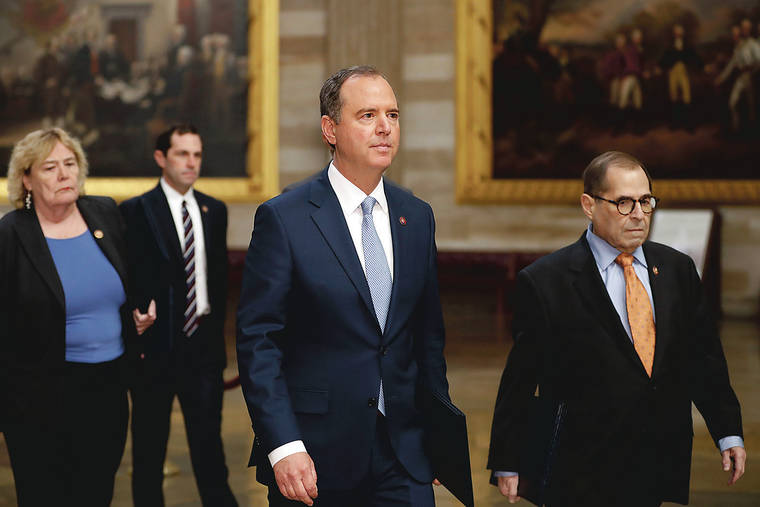WASHINGTON — President Donald Trump’s lawyers on Sunday previewed their impeachment defense with the questionable assertion that the charges against him are invalid, adopting a position rejected by Democrats as “nonsense” as both sides sharpened their arguments for trial.
“Criminal-like conduct is required,” said Alan Dershowitz, a constitutional lawyer on Trump’s defense team. Dershowitz said he will be making the same argument to the Senate and if it prevails, there will be “no need” to pursue the witness testimony or documents that Democrats are demanding.
The argument is part of a multi-pronged strategy the president’s team is developing ahead of its impeachment trial brief, which is due today. Trump asserts that his Ukraine pressure was “perfect” and that he is the victim of a witch hunt.
But the “no crime, no impeachment” approach has been roundly dismissed by scholars and Democrats, who were fresh off a trial brief that called Trump’s behavior the “worst nightmare” of the country’s founders. In their view, the standard of “high crimes and misdemeanors” is vague and open-ended in the Constitution and meant to encompass abuses of power that aren’t necessarily illegal.
The White House is pushing an “absurdist position,” said Rep. Adam Schiff, D-Calif., the lead Democratic prosecutor of the impeachment case. “That’s the argument I suppose you have to make if the facts are so dead set against you.” Rep. Jerrold Nadler, D-N.Y., another impeachment prosecutor, called it “arrant nonsense” and said evidence of Trump’s misconduct is overwhelming.
The back-and-forth came as all concerned agitated for the Senate to get on with the third impeachment trial in the nation’s history. Behind the scenes Sunday, the seven House managers were meeting on strategy with staff and shoring up which prosecutor will handle which parts of the case. They were expected to do a walk-through of the Senate chamber today around lunchtime, according to multiple Democrats working on impeachment who spoke on condition of anonymity to discuss plans.
The White House, meanwhile, was working on its response to the House’s brief outlining the charges.
No senators were more eager to get going than the four Democratic presidential candidates facing the prospect of being marooned in the Senate ahead of kickoff nominating votes in Iowa and New Hampshire.
“I’d rather be here,” said Vermont Sen. Bernie Sanders on New Hampshire Public Radio while campaigning Sunday in Concord.
During the trial, Sanders and other senators are required to sit mutely for perhaps six grueling hours of proceedings daily — except Sundays, per Senate rules — in pursuit of the “impartial justice” they pledged to pursue. But there was scant evidence that anyone’s mind was really open about whether Trump’s pressure on Ukraine to help him politically amounted to impeachable conduct or removal from office.
Mystery, however, abounded over the trial’s ground rules. Senate Majority Leader Mitch McConnell, R-Ky., shed no light on how the proceedings will follow — and differ from — the precedent of President Bill Clinton’s impeachment trial in 1999.
“The president deserves a fair trial. The American people deserve a fair trial. So let’s have that fair trial,” said Democratic Rep. Jason Crow of Colorado.
But what’s fair is as vigorously disputed as the basic question of whether Trump’s pressure on Ukraine to help him politically merits a Senate conviction and removal from office. The stakes are enormous, with historic influence on the fate of Trump’s presidency, the 2020 presidential and congressional elections and the future of any presidential impeachments.
Whatever happens in the Senate, House Speaker Nancy Pelosi, D-Calif., has said, Trump will “be impeached forever.” Members of Trump’s team countered that if they win a vindication for Trump, it means “there will be an acquittal forever as well,” Trump attorney Robert Ray said Sunday. “That is the task ahead.”
For all of the suspense over the trial’s structure and nature, some clues on what’s to come sharpened on Sunday.
The president’s lawyers bore down on the suggestion that House impeachment is invalid unless the accused violated U.S. law. Dershowitz’s argument, backed up by Ray, refers to an 1868 speech by Benjamin Curtis, who after serving as a Supreme Court justice acted as the chief lawyer for Andrew Johnson at his Senate impeachment trial.
“There can be no crime, there can be no misdemeanor, without a law, written or unwritten, express or implied,” Curtis told the Senate.



